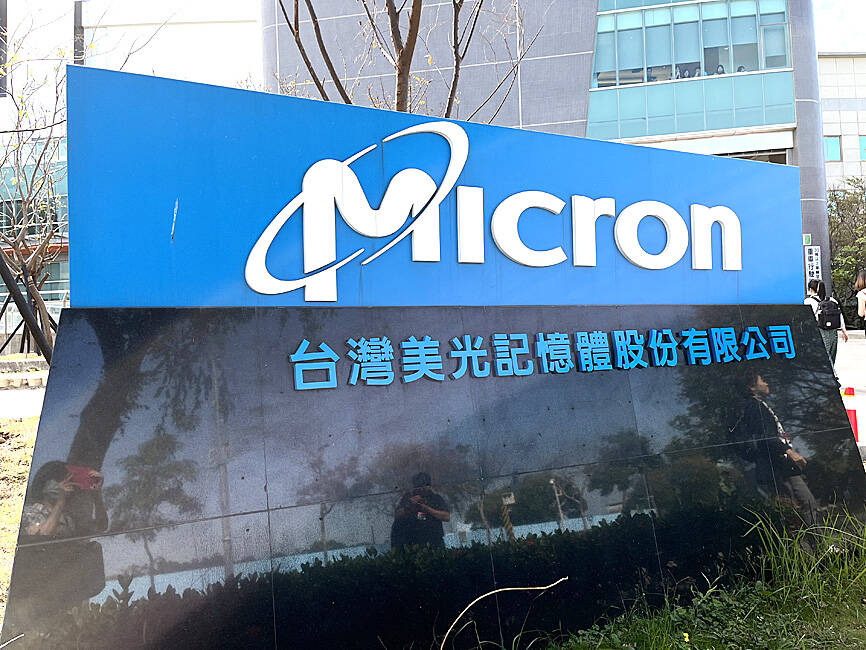Micron Technology Inc has reportedly set its sights on two facilities owned by flat-panel maker AUO Corp (友達) after Taiwan Semiconductor Manufacturing Co (TSMC, 台積電) recently clinched a deal to buy a facility and equipment from Innolux Corp (群創), another major flat-panel maker.
Micron, the world’s third-largest memorychip maker, is expected to purchase two AUO plants in Tainan to expand its advanced chip packaging and testing services and high-bandwidth memory production, local media reports said.
The two plants were shut down in August last year and AUO is seeking to dispose of the facilities, the reports said.

Photo: Grace Hung, Taipei Times
They are expected to cost Micron NT$10 billion to NT$20 billion (US$314.3 million to US$628.6 million), according to market estimates.
AUO declined to comment on the reports, only saying that it has adjusted production at its complex in Tainan and would optimize use of its facilities.
The deal between TSMC and Innolux was announced on Aug. 15, with TSMC agreeing to pay NT$17.14 billion for Innolux’s 5.5th-generation plant in the Southern Taiwan Science Park (南部科學園區) and equipment to help meet its needs for day-to-day operations.
The purchase would help expand TSMC’s advanced 3D chip-on-wafer-on-substrate (CoWoS) packaging capacity for artificial intelligence chips, analysts said.
In addition to CoWoS, TSMC said it is developing fan-out panel level packaging (FOPLP) chip packaging technology, which is more advanced than standard wafer-level packaging.
Analysts said they would not rule out TSMC teaming up with Innolux to develop FOPLP technology, citing industrial sources as saying that the two companies’ research and development teams have met.
Innolux said it expects to make a profit of about NT$14.7 billion from the sale to TSMC.
Analysts estimated that the transaction would boost Innolux’s earnings per share by NT$1.62 this year.
Separately, Innolux has reduced its paid-in capital by NT$10.8 billion, or 12 percent, by canceling about 1.089 billion shares and giving NT$1.2 in cash per share to shareholders.

Shares in Taiwan closed at a new high yesterday, the first trading day of the new year, as contract chipmaker Taiwan Semiconductor Manufacturing Co (TSMC, 台積電) continued to break records amid an artificial intelligence (AI) boom, dealers said. The TAIEX closed up 386.21 points, or 1.33 percent, at 29,349.81, with turnover totaling NT$648.844 billion (US$20.65 billion). “Judging from a stronger Taiwan dollar against the US dollar, I think foreign institutional investors returned from the holidays and brought funds into the local market,” Concord Securities Co (康和證券) analyst Kerry Huang (黃志祺) said. “Foreign investors just rebuilt their positions with TSMC as their top target,

REVENUE PERFORMANCE: Cloud and network products, and electronic components saw strong increases, while smart consumer electronics and computing products fell Hon Hai Precision Industry Co (鴻海精密) yesterday posted 26.51 percent quarterly growth in revenue for last quarter to NT$2.6 trillion (US$82.44 billion), the strongest on record for the period and above expectations, but the company forecast a slight revenue dip this quarter due to seasonal factors. On an annual basis, revenue last quarter grew 22.07 percent, the company said. Analysts on average estimated about NT$2.4 trillion increase. Hon Hai, which assembles servers for Nvidia Corp and iPhones for Apple Inc, is expanding its capacity in the US, adding artificial intelligence (AI) server production in Wisconsin and Texas, where it operates established campuses. This

US President Donald Trump on Friday blocked US photonics firm HieFo Corp’s US$3 million acquisition of assets in New Jersey-based aerospace and defense specialist Emcore Corp, citing national security and China-related concerns. In an order released by the White House, Trump said HieFo was “controlled by a citizen of the People’s Republic of China” and that its 2024 acquisition of Emcore’s businesses led the US president to believe that it might “take action that threatens to impair the national security of the United States.” The order did not name the person or detail Trump’s concerns. “The Transaction is hereby prohibited,”

Garment maker Makalot Industrial Co (聚陽) yesterday reported lower-than-expected fourth-quarter revenue of NT$7.93 billion (US$251.44 million), down 9.48 percent from NT$8.76 billion a year earlier. On a quarterly basis, revenue fell 10.83 percent from NT$8.89 billion, company data showed. The figure was also lower than market expectations of NT$8.05 billion, according to data compiled by Yuanta Securities Investment and Consulting Co (元大投顧), which had projected NT$8.22 billion. Makalot’s revenue this quarter would likely increase by a mid-teens percentage as the industry is entering its high season, Yuanta said. Overall, Makalot’s revenue last year totaled NT$34.43 billion, down 3.08 percent from its record NT$35.52